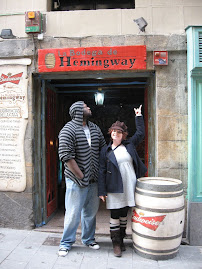I think the Christianity aspect of this is pretty interesting, especially considering that autism is considered to be such a Western, upper class condition.
Speaking of which, there was an interesting article out of Arizona about an autistic boy who was refused Communion because he refused to swallow the bread. Autistic children often have sensory issues that make swallowing certain textures and tastes uncomfortable. Instead, the nine year-old would hold the bread in his mouth for a couple seconds and then give it to his father, who would then swallow it. The Catholic church officials determined that the boy was not officially partaking in Communion and, therefore, could not continue to do so in that manner. Quite interesting implications that correspond well with this discussion here.
So, here's my abstract:
The “Suprahuman” and the “Inhuman”:
Identifying Those Of, Beyond, and Without God in Autism Texts
In recent years, autism texts have begun to explore and identify autism in terms of religion, spirituality, damnation, and salvation. For instance, in William Stiller's recent book Autism and the God Connection, Stiller, who has Asperger's Syndrome, proposes that autistic individuals possess unique spiritual qualities that, as blessed children of God, reflect the “purposeful plan to refocus us on the importance of reverence for all of humanity.” Similarly in Chuck Russell's film Bless the Child, autistic five year-old Cody O'Connor exhibits extraordinary abilities that are intended to reflect her designated status as God's crusader against Satan. In both these examples, the autistic individual possesses the unique positions as “special” children of God who are not merely “human” but are “suprahuman.”
While these two examples represent the autistic individual as possessing spiritual qualities that place him or her “closer” to God than those considered neurotypical, other autism texts describe the autistic individual as a sort of “changeling” who was transformed from “a healthy, normal” individual to one lost, cursed, or consumed by some unknown demon or monster. Parents have long described their children possessed or stolen and locked away in a remote and hidden dungeon waiting to be rescued by the perils of autism. Such representations, often reiterated in narratives by parents of autistic children (i.e., Let Me Hear Your Voice, The Sound of a Miracle, and Strange Son), equate autism--to continue to metaphor--to a hell on earth and places the autistic individual as beyond and without God.
This presentation, then, will apply current research in disability rhetoric, including Foucault's discussion on power, discourse, and mental disorder, to textual and cinematic representations of the autistic as of, beyond, and without God to illustrate how such rhetoric positions the autistic individual as “suprahuman” and “inhuman.” Such depictions--even those relatively more favorable--stigmatize the autistic individual, reinforce fears of those with ASD, and justify prejudicial practices and policies that perpetuate inadequate and even inhumane treatment and care.








1 comment:
Rochelle,
There was a similar case recently regarding a child with celiac disease. She couldn't eat the wafer (Imagine being allergic to the body of Christ--the audacity!). The church refused to offer her an alternative. I don't know what happened later. I think I saw the mother on Larry King or some such.
Post a Comment